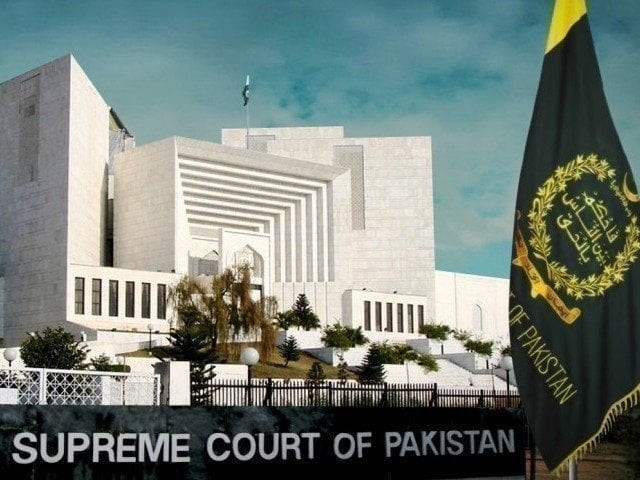Islamabad:
After submitting petitions on various questions from five Islamabad High Court (IHC) judges, the ball is now in the Supreme Court court, as it will decide their complaints in legal independence as well as trichotomy of powers.
This is not the first time the IHC judges have turned to the point. Last March, they had written a letter to Supreme Judicial Council (SJC), which requested guidance on interference with performing agencies in legal functions.
It is noteworthy that Justice Muhammad Arbab Tahir was also part of the group of judges at the time. However, he is no longer with them, which can have consequences for their case.
Former Lahore High Court judge Shahid Jamil Khan expressed deep grief over the development and said this is the worst era of Pakistan’s legal history. The judges of IHC, constitutionally demanded to dispense justice, even seek justice through a constitutional petition.
“While it is unusual to submit a petition personally, I support it as necessary to shake the conscience over the judge sitting in the same Supreme Court building where the concerned judges went in a common way to seek justice. I personally felt seductive to witness the abandoned corpus of the court.
The well -known lawyer Saiol Malook said he had read the constitutional petitions filed by IHC judges. He noted that the most important accusations in the petition – teachings of performing interference in the Supreme Court’s function, the judges were pressured not to decide cases in accordance with the constitution and legislation and violations of the legal oath – were unprecedented.
He said these accusations were not only against the executive, but also against the trooping Chief Justice and the Supreme Court in Pakistan himself.
“It seems to be a case of first impression ever brought by judges by a federal constitutional court in any country around the world. A historical burden has been placed on the Supreme Court: either to remain with constitutional protection measures and protect the fundamental rights of the judges before a constitutional court or declare that their attitude is not better than the other.
“If they are unable to maintain the constitution, they must say so openly, then the population of Pakistan knows clearly that the state’s court is a fraud and that the judges in the highest court are only admitted to a monthly salary of RS3 million plus perks worthy than RS5 million each, and no one should look at them for justice and the law and” said Malook.
Lawyer Chaudhry Faisal Hussain said that as a lawyer was a very depressing and sad day.
“It is actually painful and stressful to see my own institution crumble in such a way that the judges themselves are in the right to seek justice. This is not a person -specific question; it is the institution of the judiciary that is under attack,” he added.
He further stated that the order that restricts justice Tariq Mehmood Jahangiri was illegal and constitutional, since only under the Constitution has only the Supreme Court Council (SJC) authority to take complaints about the judges of the Superior Court.
When six IHC judges wrote to SJC earlier, they were called by former Chief Justice of Pakistan Qazi Faez Isa in the CJP house. Reports suggested that Justice Isa was visibly upset by their letter.
However, he was forced to convene a full hearing to discuss it. The next day, the former CJP met, accompanied by justice, Syed Mansoor Ali Shah, Prime Minister Shehbaz Sharif, and proposed the constitution of a commission of inquiry to investigate the claims.
When the former CJP Tassaduq Hussain Jillani repeated himself from leading the commission of inquiry, CJP ISA had no choice but to initiate Suo Motu procedures in the IHC judges’ letter.
During the consultation, various high courts also admitted that the agency’s interference in legal functions was an “open secret.” The case remains pending.
Meanwhile, the government managed to adopt the 26th constitutional amendment. The purpose of this change, critics say was to secure executive dominance over the judiciary. Since its passage, the government has largely managed to tighten its control.
When five judges challenged the transfer of three judges to IHC, the Apex Court approved the executive plan. Now IHC judges have once again approached the Supreme Court.
Senior lawyers believe that the exercise wants SJC to be activated against Justice Jahangiri.
The role of six SC judges will be crucial in issues relating to IHC judges. Similarly, the role of three SJC members – CJP Yahya Afridi, Justice Syed Mansoor Ali Shah and Justice Munib Akhtar – will also be crucial. Likewise, a committee with three members consisting of Justice Aminuddin Khan, justice Jamal Khan Mandokhail and Justice Muhammad Ali Mazhar will decide the fixing of their petitions.
There is a perception that neither the five IHC judges nor the IHC High Court Sardar Muhammad Sarfraz Dogar are in the good books in a certain part of the judiciary that are currently holding sway in SC.
The detailed judgment of the IHC judges’ transfer case will be important. Even the minority opinion can support the attitude of the five IHC judges.



